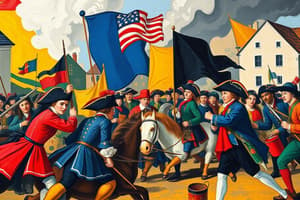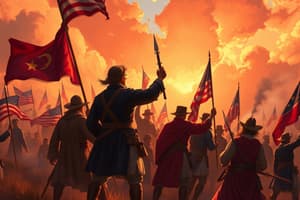Podcast
Questions and Answers
What was one primary cause of the American Revolution mentioned in chapters 3 and 4?
What was one primary cause of the American Revolution mentioned in chapters 3 and 4?
Which event marked a significant turning point in the American Revolution as discussed in the chapters?
Which event marked a significant turning point in the American Revolution as discussed in the chapters?
What role did propaganda play in the American Revolution according to these chapters?
What role did propaganda play in the American Revolution according to these chapters?
Which document is highlighted for its significance in promoting the American independence movement?
Which document is highlighted for its significance in promoting the American independence movement?
Signup and view all the answers
What tactic did the colonists adopt to combat British control as mentioned in chapters 3 and 4?
What tactic did the colonists adopt to combat British control as mentioned in chapters 3 and 4?
Signup and view all the answers
Study Notes
Primary Causes of the American Revolution
- One primary cause of the American Revolution was the growing discontent among the colonists regarding taxation without representation. This sentiment arose from a series of British laws that imposed taxes on the colonies without their input or consent. Key legislation that fueled this anger included the Stamp Act, enacted in 1765, which required colonists to purchase special stamped paper for legal documents, newspapers, and other publications, effectively placing a tax on paper products. This act was met with widespread protests and was a significant factor in uniting various colonies against British rule. Similarly, the Townshend Acts of 1767, which imposed duties on goods such as glass, paint, and tea, further escalated tensions, leading to boycotts and demonstrations aimed at opposing British economic control. The underlying principle of 'no taxation without representation' became a rallying cry for colonists who believed they should have a voice in the legislative decisions that affected their lives.
Turning Point in the American Revolution
- The Battle of Saratoga, fought in 1777, is highlighted as a significant turning point in the American Revolution. This battle was not only a decisive victory for the American forces but also served as a crucial pivot in the larger conflict. Following the American triumph, the victory convinced France of the viability of the American cause against Great Britain, leading to a formal alliance in 1778. French military support provided the Americans with essential resources, troops, and naval power, which significantly bolstered their efforts and morale. This alliance would prove instrumental in the ultimate success of the revolution, as it helped turn the tide of the war in favor of the colonies.
Role of Propaganda
- Propaganda played a crucial role in the American Revolution by shaping public opinion and rallying widespread support for independence. Various forms of communication, including pamphlets, newspapers, and public speeches, were utilized effectively to spread revolutionary ideas. Notably, publications such as the Massachusetts Spy and The Pennsylvania Journal helped to inform and mobilize the populace, creating a shared sense of purpose among colonists. Figures like Samuel Adams and Patrick Henry used public speeches to stir emotions and articulate the colonies' grievances against British tyranny. This strategic use of propaganda not only galvanized support among the colonists but also sought to sway public sentiment in Britain and Europe.
Significant Document
- Thomas Paine's "Common Sense", published in January 1776, is emphasized for its influential arguments advocating for complete independence from British rule. In this pamphlet, Paine combined moral and political reasoning to argue that it was not only practical but also a fundamental right of the colonists to break free from monarchical tyranny. His clear and compelling prose convinced many undecided colonists of the necessity of separation from Britain, presenting independence as a logical step toward self-governance and justice.
Tactics of Colonists
-
The colonists adopted a variety of tactics to protest British control and assert their rights, with boycotts of British goods being a particularly effective strategy. These boycotts reflected the colonists' refusal to accept unjust taxation by undermining the economic interests of British merchants. In addition to this, colonists organized resistance through groups such as the Sons of Liberty, which was formed in response to oppressive British measures. This organization played a significant role in coordinating protests, disseminating revolutionary ideas, and enforcing boycotts, demonstrating the power of collective action and solidarity among the colonies.
-
al turning point in the American Revolution. This pivotal battle resulted in a decisive victory for the American forces against the British, and it is often credited with convincing France to formally ally with the colonies. The French government recognized the potential for American independence and agreed to provide military support, supplies, and soldiers. This new alliance not only bolstered the morale of American forces but also significantly altered the balance of power in the conflict, making it clear that the war was not just a local dispute but a global one involving major European powers.
Role of Propaganda
- Throughout the revolutionary period, propaganda played a crucial role in shaping public opinion and rallying support for the independence movement. Various mediums such as pamphlets, newspapers, and speeches were utilized to disseminate revolutionary ideas and galvanize the populace. These efforts were pivotal in creating a unified sentiment against British rule and in promoting the ideals of liberty and self-determination. Prominent figures such as Paul Revere effectively used engravings and pamphlets to communicate the grievances of the colonies and to motivate citizens to join the cause for independence. The widespread circulation of these materials helped transform the narrative surrounding the conflict and emboldened many to take action in support of independence.
Significant Document
- Thomas Paine's "Common Sense", published in 1776, is emphasized for its profound impact on the revolutionary thought of the time. The pamphlet articulated compelling arguments favoring independence from Britain and advocated for the establishment of a republic. Paine's clear and accessible writing style made complex political ideas understandable to the average colonist, and it helped galvanize public support for the revolutionary cause. His assertions about the necessity of breaking free from monarchy and the injustices faced by the colonies encouraged many to reconsider their loyalties and contemplate the prospects of a self-governing nation.
Tactics of Colonists
- In their resistance to British rule, the colonists adopted several effective tactics, one of which was the widespread boycott of British goods. These boycotts were organized as a form of economic protest designed to undermine British authority and commerce, compelling Britain to reconsider its oppressive policies. Additionally, colonists formed groups such as the Sons of Liberty, which played a pivotal role in organizing and mobilizing grassroots efforts against British rule. These groups engaged in direct actions, such as sabotaging British shipments and promoting resistance. Their combined efforts fostered a sense of unity and solidarity among the colonies, laying the groundwork for coordinated actions in the fight for independence.
Studying That Suits You
Use AI to generate personalized quizzes and flashcards to suit your learning preferences.
Description
Test your knowledge on the American Revolution through the lens of chapters 3 and 4 from the Grade 8 My World Interactive history curriculum. Explore primary causes, significant events, the role of propaganda, key documents, and strategies used by the colonists against British control. This quiz will help reinforce your understanding of this pivotal moment in history.




